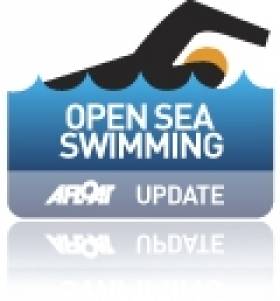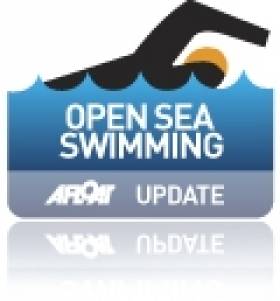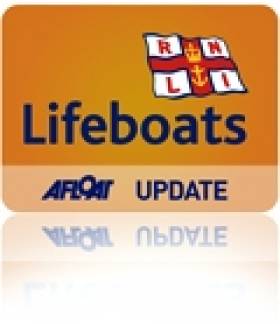Displaying items by tag: swimmer
Donegal Man (83) Dips in Lakes in 32 Counties for Motor Neurone Disease
An 83-year-old Donegal man has set out to swim or dip in lakes across the 32 counties of Ireland to raise funds for the Irish Motor Neurone Disease Association (IMNDA).
Paddy Conaghan estimates it will take six weeks to complete his challenge, entitled “Ducking and Driving Around the Lakes of Ireland for IMNDA”.
It is his third consecutive year to take on the venture in aid of various charities, and he says that this year all funds raised will go towards people living with motor neurone Disease and their families.
Conaghan began the challenge on Sunday just past (January 7t) at Loch Eamhnaigh, Arranmore island, and his second day of lake dipping was in Lough Gill, Co Leitrim on Monday – when he also marked his 83rd birthday.
 Swimmer Paddy Conaghan and his supporters
Swimmer Paddy Conaghan and his supporters
He was in Sligo on Tuesday, and plans to visit Achill on Wednesday, January 10th, followed by Mayo on January 11th.
“I am thrilled to once again take on this exciting challenge, swimming across the many lakes dotting the landscape of our 32 counties, all in support of the IMNDA,” Conaghan has said.
“It won’t be easy, it’s bitterly cold, but the generosity and support of donors and well-wishers spurs me on and enables us to make a real difference in the lives of those battling motor neurone disease,”he said.
Supporters and well-wishers are invited to join Conaghan at various lakes across the country to cheer him on as he takes the plunge.
His journey and progress can be followed on his Facebook page where details of his next swims are posted daily.
To contribute to Paddy Conaghan’s fundraising efforts visit here
#coastguard – A massive search is underway for a missing swimmer in the Ravenglass estuary.
Liverpool Coastguard took a 999 call from a member of the public just after 9am this morning. They reported seeing a man up to his chest in the water and then attempt to swim across the estuary. He soon disappeared from view but his dog made it back to shore and was barking for his owner.
The Millom and Whitehaven Coastguard Rescue Teams, the search and rescue helicopter from RAF Valley, the St Bees RNLI inshore lifeboat, the Haverigg inshore rescue boat, along with Cumbria Fire and Rescue, Cumbria Police and North West Ambulance Service have been sent to the scene.
Paul Parkes, Watch Manager at Liverpool Coastguard, said:
"We are currently coordinating a large-scale search and doing all we can to find this missing man.
"If anyone was in the area earlier this morning and has information on this swimmer, please call Liverpool Coastguard on 01519 313341
Body Found In Search For Missing Dalkey Island Swimmer
#MissingSwimmer - RTÉ News is reporting that a swimmer taken from the water after going missing off Dalkey Island in Dublin Bay this morning (Sunday 7 April) has died.
Earlier this evening The Irish Times reported that the 35-year-old man was in a critical condition in Tallaght Hospital after being recovered from the water off Sorrento Terrace.
Lifeboat volunteers with Dun Laoghaire RNLI and the Irish Coast Guard's Dublin-based helicopter Rescue 116 were involved in the search which began around 11am today after the swimmer failed to return to shore.
Round Fastnet Swimmer Nominated Again for World Award
#OPEN SEA SWIMMING – A Cork man has been nominated as World Open Water Swimming Man of the Year 201. Stephen Redmond, from Cork, has accomplished some of the world's toughest marathon swims.
One of 1, 200 to have swum the English Channel and one of only 12 to have swum the North Channel (between NI and Scotland) - Stephen is a superstar in the sport.
{youtube}1Hw4YIdu6MY{/youtube}
In a short period this autumn Stephen added the well known Catalina Channel to his list of accomplishments soon after he became the first swimmer ever to swim around the Fastnet Rock. Going around the rock is not the 300 meters you might think. Stephen started in Baltimore, circled the Fastnet and finished in Schull.
For the second year in a row he has been nominated for this global award.
Nominations for the annual World Open Water Swimming Man of the Year were announced today by Open Water Source.An eclectic group of 12 accomplished individuals from 9 countries were selected among the millions of athletes in the fastest growing sport in the world.
Their stories, their exploits and their lifestyles are extraordinarily inspirational as they are all passionately attracted and committed to a sport inherent with risks, challenges and beauty.
These awards not necessarily for the best athlete, but are meant to honor the individual who (1) best embodies the spirit of open water swimming, (2) possesses the sense of adventure, tenacity and perseverance that open water swimmers are known for, and (3) has most positively influenced the world of open water swimming in 2011.
Lifeboat Launches for Swimmer in Difficulty on Dublin Bay
A swimmer in difficulty was brought to safety at lunchtime today by the RNLI inshore lifeboat from Dun Laoghaire when a large swell caused problems at the popular 40-foot bathing-place at Sandycove, Co. Dublin.
The incident occurred when the female swimmer was unable to get ashore because of a breaking swell along the rocky shoreline. A male swimmer entered the water with a life-ring and supported the casualty while a member of the public telephoned 999 and asked for Marine Rescue.
The Irish Coastguard Marine Rescue Co-ordination Centre (MRCC) at Dublin received the alert and tasked the RNLI inshore lifeboat (ILB) at Dun Laoghaire shortly after 12.30pm. The volunteer crew of three launched seven
minutes later and recovered both swimmers from the water and landed them at Sandycove Harbour. A third swimmer was able to make his own way ashore and did not require assistance.
Weather conditions were fine with almost no wind but a sea-swell left-over from the near gale force winds last night combined with a flooding spring tide made swimming conditions more difficulty than usual. All three swimmers were reported to daily-regulars. None needed medical attention.
The ILB at Dun Laoghaire is an IB1-type that was recently placed on station and will be officially dedicated next year. The fully-inflatable boat is faster than its predecessor delivering a top speed of 25 knots and is ideal for reaching casualties close to rocks or shallow areas.
The crew of the ILB was Gary Hayes (Helmsman) Dan O'Sullivan and Sean Shanahan.
Related Safety posts
RNLI Lifeboats in Ireland
Safety News
Rescue News from RNLI Lifeboats in Ireland
Coast Guard News from Ireland
Water Safety News from Ireland
Marine Casualty Investigation Board News
Marine Warnings



























































